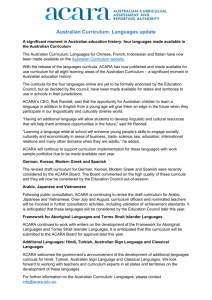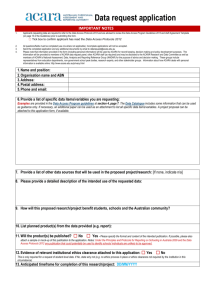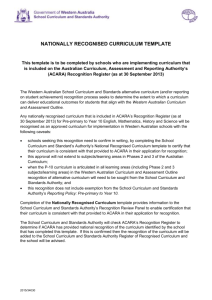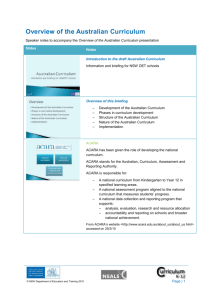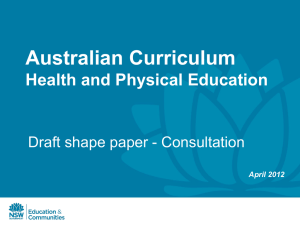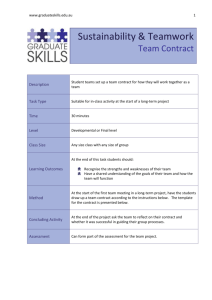DOCX file of ACARA Budget Statements (0.16 MB )
advertisement
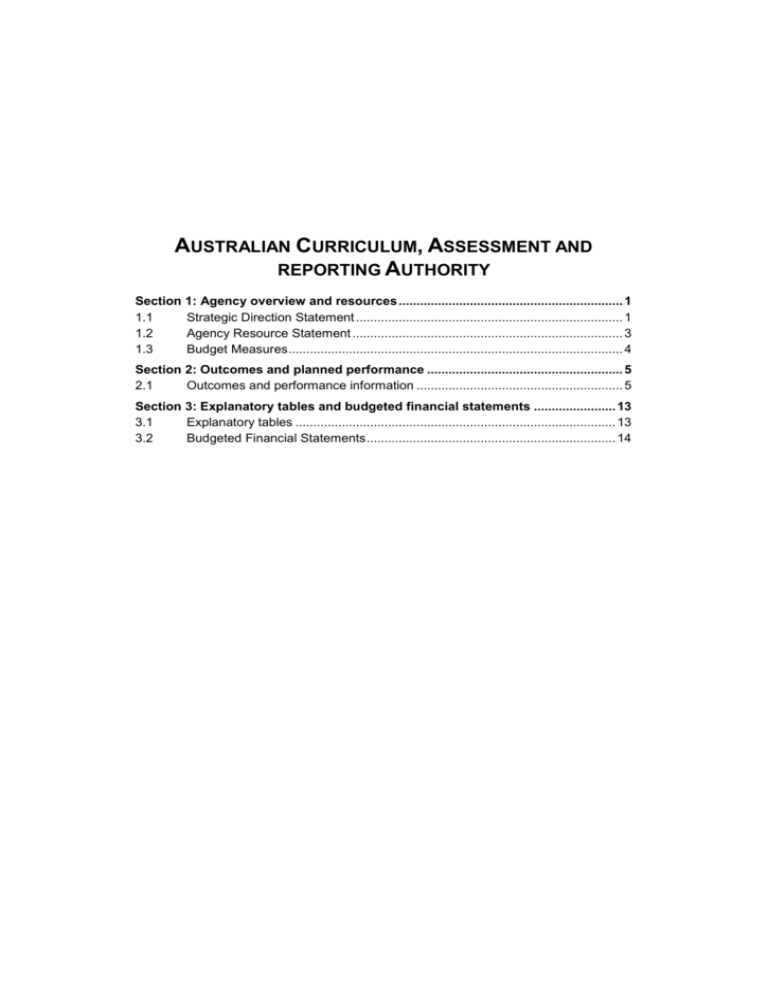
AUSTRALIAN CURRICULUM, ASSESSMENT AND REPORTING AUTHORITY Section 1: Agency overview and resources ............................................................... 1 1.1 Strategic Direction Statement ........................................................................... 1 1.2 Agency Resource Statement ............................................................................ 3 1.3 Budget Measures .............................................................................................. 4 Section 2: Outcomes and planned performance ....................................................... 5 2.1 Outcomes and performance information .......................................................... 5 Section 3: Explanatory tables and budgeted financial statements ....................... 13 3.1 Explanatory tables .......................................................................................... 13 3.2 Budgeted Financial Statements ...................................................................... 14 ACARA Budget Statements – Overview & resources AUSTRALIAN CURRICULUM, ASSESSMENT AND REPORTING AUTHORITY Section 1: Agency overview and resources 1.1 STRATEGIC DIRECTION STATEMENT 2. The Australian Curriculum, Assessment and Reporting Authority (ACARA) was established under the Australian Curriculum, Assessment and Reporting Authority Act 2008 (ACARA Act) of the Parliament of the Commonwealth of Australia. The legislation was assented to on 8th December, 2008. ACARA is tasked to execute the policy directions that are determined by the Standing Council on School Education and Early Childhood (SCSEEC) regarding curriculum, assessment, data collection and reporting at a national level. ACARA is responsible for delivering: • An Australian Curriculum from Foundation1 to Year 12 in specified learning areas. • A national assessment program aligned to the national curriculum that measures students’ progress. • A national data collection and reporting program that supports: – analysis, evaluation, research and resource allocation; and – accountability and reporting on schools and broader national achievement. ACARA’s work in developing the Australian Curriculum is guided by the 2008 Melbourne Declaration on Educational Goals for Young Australians. The Melbourne Declaration commits ‘to supporting all young Australians to become successful learners, confident and creative individuals, and active and informed citizens’, and to promoting equity and excellence in education. The Australian Curriculum will ‘equip all young Australians with the essential skills, knowledge and capabilities to thrive and compete in a globalised world and information rich workplaces of the current century.’ The curriculum will be accessible to all young Australians, regardless of their social or economic background or the school they attend. 1 The term Foundation Year is used as a nationally consistent term for the year of schooling prior to Year 1 for the purpose of the Australian Curriculum. It does not replace the equivalent terms used in states and territories – Kindergarten (NSW/ACT), Prep (QLD/VIC/TAS), Pre-primary (WA), Reception (SA) and Transition (NT). 1 ACARA Budget Statements – Overview & resources The Australian Curriculum for English, mathematics, science and history for Foundation to Year 10 was published in December 2010. Following a validation process, the Achievement Standards for English, mathematics, science and history were revised and endorsed in October 2011. Development continues in relation to the senior secondary curriculum in these learning areas, with publication planned for December 2012. A second phase of curriculum development relates to the Australian Curriculum for geography, languages and the arts. Geography F-12 curriculum writing began in February 2011 and consultation on the draft curriculum took place between October 2011 and February 2012. The shape papers for the arts and languages were released in August and November 2011 respectively, and writing of detailed curriculum for these two areas commenced soon after. The third phase of Australian Curriculum development applies to Technologies, Health and Physical Education, Economics and Business and Civics and Citizenship. The draft Shape of the Australian Curriculum papers for Technologies and Health and Physical Education were released for public consultation in March 2012, with consultation on shape papers for Economics and Business and Civics and Citizenship to occur in mid-2012. ACARA is working towards completion of the F-10 curriculum, across all learning areas, by the end of 2013. The National Assessment Program (NAP) encompasses a suite of assessments endorsed by SCSEEC including the National Assessment Program – Literacy and Numeracy (NAPLAN) and three-yearly sample assessments in Science Literacy, Civics and Citizenship, and ICT Literacy. ACARA took up responsibility for managing the development and overseeing the delivery of tests for NAPLAN and NAP in 2010 along with associated reporting requirements. ACARA is responsible for collecting, managing, analysing, evaluating and reporting statistical and related information about educational outcomes. This includes the development and publication of national performance measures, performance standards and national definitions. ACARA publishes a National Report on Schooling in Australia for each calendar year and will publish the report for 2010 in the first half of 2012 and the report for 2011 in early 2013. This report informs the Australian public on progress against the national goals for schooling and agreed national performance measures. ACARA is also responsible for collecting data from schools for the purposes of accountability and reporting, research and analysis, and resource allocation. Information on individual schools is published on the My School website, which was launched in early 2010 and is updated annually. The third release of My School occurred in February 2012 and provided an additional year of information for all schools, with four years of student assessment data now available. The 2012 release of My School also included enhanced representations of student gain and more detailed information on student participation in vocational education and training in schools. 2 ACARA Budget Statements – Overview & resources 1.2 AGENCY RESOURCE STATEMENT Table 1.1 shows the total resources from all sources. The table summarises how resources will be applied by outcome and by administered and departmental classification. Table 1.1: Australian Curriculum, Assessment and Reporting Authority Resource Statement — Budget Estimates for 2012-13 as at Budget May 2012 Estimate of prior year amounts available in 2012- 13 $'000 Sourc e + Proposed at Budget 2012- 13 $'000 = Total estimate Ac tual available appropriation 2012- 13 $'000 2011- 12 $'000 O pe ning ba la nc e / Re se rve s a t ba nk REV ENUE FRO M G O V ERNMENT Tota l ordina ry a nnua l se rvic e s - - - - Tota l othe r se rvic e s - - - - Tota l a nnua l a ppropria tions - - - - 3 P a yme nts from re la te d e ntitie s Amounts from the portfolio department Amounts from other agenc ies Tota l - 15,450 15 , 4 5 0 15,450 15 , 4 5 0 - S pe c ia l Ac c ounts (portfolio a ge nc y) 4 Name of Spec ial Ac c ount Tota l S pe c ia l Ac c ount - - - - Tota l funds from G ove rnme nt - 15 , 4 5 0 15 , 4 5 0 - FUNDS FRO M O THER S O URCES Interest Royalties Sale of goods and servic es Other Tota l - 250 15,450 15 , 7 0 0 250 15,450 15 , 7 0 0 -- Tota l ne t re sourc ing for a ge nc y 3 1, 15 0 3 1, 15 0 All figures are GST exc lusive CRF - Consolidated Revenue Fund ACARA is not direc tly appropriated as it is a CAC Ac t body. Appropriations are made to DEEWR whic h are then paid to ACARA and are c onsidered 'departmental' for all purposes. 3 Funding provided by a Government body that is not spec ified within the annual appropriation bills as a payment to the CAC Ac t body (for example, a fee for servic e from an FMA Ac t agenc y paid to a CAC Ac t body would appear here and may be explained within this footnote, as would a payment from a third agenc y's spec ial appropriation). 4 A CAC Ac t body may rec eive payment from a spec ial ac c ount held by an FMA Ac t agenc y. The CAC Ac t body does not hold the spec ial ac c ount itself and therefore does not have a balanc e c arried forward from earlier years. 3 ACARA Budget Statements – Overview & resources 1.3 BUDGET MEASURES ACARA does not have any new measures since the 2011-12 Budget. For this reason Table 1.2 is not presented 4 ACARA Budget Statements – Outcomes & performance Section 2: Outcomes and planned performance 2.1 OUTCOMES AND PERFORMANCE INFORMATION Government outcomes are the intended results, impacts or consequences of actions by the Government on the Australian community. Commonwealth programs are the primary vehicle by which government agencies achieve the intended results of their outcome statements. Agencies are required to identify the programs which contribute to Government outcomes over the Budget and forward years. Each outcome is described below together with its related programs, specifying the performance indicators and targets used to assess and monitor the performance of the Australian Curriculum, Assessment and Reporting Authority in achieving Government outcomes. Outcome 1: Improved quality and consistency of school education in Australia through national curriculum, national assessment, data collection and performance reporting system. Outcome 1 Strategy ACARA will continue to work collaboratively with a wide range of stakeholders including teachers, principals, government, state and territory education authorities, professional education associations, business/industry, community groups and the broader public. Curriculum • To establish the F-12 Australian Curriculum including development of content, content elaborations, achievement standards and annotated work samples for all learning areas listed in the Melbourne Declaration on Educational Goals for Young Australians. • To ensure that the Australian Curriculum caters for and engages all learners, including students with disabilities and those for whom English is an additional language/dialect. • To ensure that the Australian Curriculum gives due emphasis to general capabilities and to the cross-curricular dimensions of Aboriginal and Torres Strait Islander histories and cultures, Asia and Australia’s engagement with Asia and sustainability. • To develop and implement a rigorous approach to benchmarking the Australian Curriculum with curricula of leading nations. 5 ACARA Budget Statements – Outcomes & performance • To enhance public understanding and awareness of the Australian Curriculum. Assessment and reporting • To align national assessments with the Australian Curriculum and ensure that they validly, reliably and fairly capture achievement across a wide range of learning areas and valued outcomes, particularly those capabilities of special importance in the 21st century. • To develop with key stakeholders and strategic partners options for national consistency in senior secondary assessment and certification. • To ensure that national assessments enable accurate monitoring of student and school performance and progress while promoting good pedagogical practices. • To provide a richer array of information on Australian schools and on student achievement, progress and participation. • To extend and improve ways of enabling schools to benchmark their performance against other schools with similar characteristics and similar student backgrounds and academic starting points. • To further develop national key performance measures, including measures of student engagement and stakeholder satisfaction. Supporting improvement • To establish productive partnerships with jurisdictions, agencies and professional associations to provide tools and resources to support schools, teachers and the public in understanding, implementing and interacting with the Australian Curriculum. • To coordinate a cooperative, national approach to supporting teachers in using assessments and standards to obtain feedback to improve teaching and learning. • To provide analyses and reports on performance to facilitate more informed curriculum and teaching decision-making. Building capacity • To align governance and operations within ACARA and create a high performance organisation that can fully meet client expectations. • To strengthen connections between ACARA’s stakeholders and strategic partners. • To leverage international knowledge and practice in curriculum, assessment and reporting to ensure leading edge practice. 6 ACARA Budget Statements – Outcomes & performance • To work with the Australian Institute for Teaching and School Leadership, Education Services Australia and jurisdictions in developing and delivering professional learning and training in curriculum and assessment. Outcome Expense and Resource Statement Table 2.1 provides an overview of the total expenses for Outcome 1 by program. Table 2.1: Budgeted Expenses and Resources for Outcome 1 Outcom e 1: Im porved quality and consistency of school education in Australia through a national curriculum , national assessm ent, data collection and perform ance reporting system . Program 1.1: National Curriculum Revenue from Government Payment from related entities Revenues from other independent sources Total for Program 1.1 Program 1.2: National Data Collection and Reporting Revenue from Government Payment from related entities Revenues from other independent sources Total for Program 1.2 Program 1.3: National Assessm ent Revenue from Government Payment from related entities Revenues from other independent sources Total for Program 1.3 2011-12 Estimated actual expenses $'000 2012-13 Estimated expenses 5,462 6,741 6,126 6,377 12,203 12,503 1,928 3,076 3,330 3,330 5,004 6,660 5,385 6,659 5,994 5,993 $'000 12,044 11,987 Outcom e 1 Totals by resource type Revenue from Government Payment from related entities Revenues from other independent sources 12,775 16,476 15,450 15,700 Total expenses for Outcom e 1 29,251 31,150 2011-12 96 2012-13 97 Average Staffing Level (num ber) 7 ACARA Budget Statements – Outcomes & performance Contributions to Outcome 1 Program 1.1: National Curriculum Program 1.1 objectives • To establish the F-12 Australian Curriculum including development of content, content elaborations, achievement standards and annotated work samples for all learning areas listed in the Melbourne Declaration on Educational Goals for Young Australians. • To ensure that the Australian Curriculum caters for and engages all learners, including students with disabilities and those for whom English is an additional language/dialect. • To ensure that the Australian Curriculum gives due emphasis to general capabilities and to the cross-curricular dimensions of Indigenous history and culture, Asia and sustainability. • To develop and implement a rigorous approach to benchmarking the Australian Curriculum with curricula of leading nations. • To enhance public understanding and awareness of the Australian Curriculum. Program 1.1 expenses ACARA has not identified any significant trends, changes or variances in program expenses over the forward years. 2011-12 Revised budget $'000 1.1.1 - National Curriculum Annual departmental expenses: Payment from related entities 5,462 Revenues from Independent Resources 6,741 Total component expenses 12,203 1.1.2 - National Data Collection and Reporting Annual departmental expenses: Payment from related entities 1,928 Revenues from Independent Resources 3,076 Total component expenses 5,004 1.1.3 - National Assessment Annual departmental expenses: Payment from related entities 5,385 Revenues from Independent Resources 6,659 Total component expenses 12,044 Total program expenses 29,251 8 2012-13 Budget $'000 2013-14 Forw ard year 1 $'000 2014-15 Forw ard year 2 $'000 2015-16 Forw ard year 3 $'000 6,126 6,377 12,503 5,173 5,424 10,597 4,174 4,424 8,598 3,852 4,103 7,955 3,330 3,330 6,660 3,336 3,336 6,672 3,598 3,599 7,197 3,782 3,781 7,563 5,994 5,993 11,987 5,991 5,990 11,981 4,678 4,677 9,355 4,566 4,566 9,132 31,150 29,250 25,150 24,650 ACARA Budget Statements – Outcomes & performance Program 1.1 Deliverables • Shape of the Australian Curriculum v4.0, including articulation of the place of all learning areas, general capabilities and cross–curriculum priorities within the context of the overall school curriculum approved. • Nationally agreed and consistent approaches for assessment and reporting in relation to the F–10 Australian Curriculum further developed. • Senior secondary curriculum for the Phase 1 learning areas English, mathematics, science and history finalised and submitted to Ministers for approval. • Articulation of how the Australian Curriculum meets the learning needs of students with special education needs and of students for whom English is another language or dialect (EAL/D) completed. • Publication of F-10 Australian Curriculum for geography, languages (Chinese, Italian and an Aboriginal and Torres Strait Islander Languages Framework) and the arts. • Writing of the Australian Curriculum to be well advanced in the Phase 3 learning areas of health and physical education and technologies, and shape papers for the civics and citizenship and economics and business studies learning areas published. • Process for monitoring and evaluation of implemented Australian Curriculum reviewed and endorsed by states and territories. Program 1.1 Key Performance Indicators • Each phase of the Australian Curriculum is delivered within the timeframes agreed by SCSEEC. • The Australian Curriculum caters for and engages all learners, including students with disabilities and those for whom English is an additional language/dialect. • The Australian Curriculum gives due emphasis to general capabilities and to the cross-curricular priorities of Aboriginal and Torres Strait Islander histories and cultures, Asia and Australia’s engagement with Asia and sustainability. 9 ACARA Budget Statements – Outcomes & performance Program 1.2: National Data Collection and Reporting Program 1.2 objectives • To provide a richer array of information on Australian schools and on student achievement, progress and participation. • To extend and improve ways of enabling schools to benchmark their performance against other schools with similar characteristics and similar student backgrounds and academic starting points. • To further develop national key performance measures, including measures of student engagement and stakeholder satisfaction. Program 1.2 expenses ACARA has not identified any significant trends, changes or variances in program expenses over the forward years. Program 1.2 deliverables • New release of information on the My School website. • Integrated platform for delivery of national school opinion surveys developed. • National Report on Schooling in Australia 2011 published. • NAP Sample Public Report, and NAPLAN Summary and National Reports 2012 published. Program 1.2 Key Performance Indicators • The data reported in the National Report on Schooling in Australia, the NAPLAN reports and on the My School website are materially accurate. • The National Report on Schooling, NAPLAN Summary Report, NAPLAN National Report, and NAP Sample Public Report are published annually. • An additional year’s data on the My School website is provided, including any specific new measures requested by Ministers. 10 ACARA Budget Statements – Outcomes & performance Program 1.3: National Assessment Program 1.3 objectives • To align national assessments with the Australian Curriculum and ensure that they validly, reliably and fairly capture achievement across a wide range of learning areas and valued outcomes, particularly those capabilities of special importance in the 21st century. • To develop with key stakeholders and strategic partners options for national consistency in senior secondary assessment and certification. • To ensure that national assessments enable accurate monitoring of student and school performance and progress while promoting good pedagogical practices. Program 1.3 expenses ACARA has not identified any significant trends, changes or variances in program expenses over the forward years. Program 1.3 deliverables • Delivery and analysis of National Assessment Program – Literacy & Numeracy (NAPLAN) tests. • Delivery and analysis of National Assessment Program – Sample Assessment (triennial cycle) tests. • Phase one investigation report for online delivery of NAP tests. • Draft national assessment frameworks aligned with the Australian Curriculum. • Revised architecture and Key Performance Measures for NAP Sample program. • Enhanced protocols to provide an agreed framework for nationally consistent test administration. 11 ACARA Budget Statements – Outcomes & performance Program 1.3 Key Performance Indicators • NAPLAN and NAP Sample tests are conducted annually. • NAPLAN and NAP Sample results are analysed accurately and meaningfully for reporting against common scales. • Greater consistency is achieved in national test administration and ensuring test integrity. • Investigation report for online delivery of NAP tests is provided to SCSEEC. • Draft assessment frameworks aligned with the Australian Curriculum are finalised. • Revised architecture and Key Performance Measures for the NAP Sample program are approved by SCSEEC. 12 ACARA Budget Statements – Budgeted financial statements Section 3: Explanatory tables and budgeted financial statements Section 3 presents explanatory tables and budgeted financial statements which provide a comprehensive snapshot of agency finances for the 2012-13 to 2015-16 budget years. It explains how budget plans are incorporated into the financial statements and provides further details of the reconciliation between appropriations and program expenses, movements in administered funds, special accounts and government indigenous expenditure. 3.1 EXPLANATORY TABLES 3.1.1 Movement of administered funds between years ACARA has no administered funds. For this reason Table 3.1.1 is not presented. 3.1.2 Special Accounts ACARA has no special accounts. For this reason Table 3.1.2 is not presented. 3.1.3 Australian Government Indigenous Expenditure The 2012-13 Australian Government Indigenous Statement is not applicable because ACARA has no Indigenous specific expenses. For this reason Table 3.1.3 is not presented. 13 ACARA Budget Statements – Budgeted financial statements 3.2 BUDGETED FINANCIAL STATEMENTS 3.2.1 Differences in agency resourcing and financial statements There are no differences in agency resourcing and the financial statements. 3.2.2 Analysis of budgeted financial statements The Commonwealth has allocated funding for ACARA of up to $54.6 million from 2012-13 to 2015–16. In October 2011 Ministers agreed to ACARA’s total budget of $109.2 million over four years, 2012-13 to 2015-16 being equally shared between the Commonwealth and the States and based on the current Territories SCSEEC funding formula. 14 ACARA Budget Statements – Budgeted financial statements 3.2.3 Budgeted financial statements tables Table 3.2.1 Comprehensive Income Statement (Showing Net Cost of Services) (for the period ended 30 June) Estimated actual 2011-12 $'000 Budget estimate 2012-13 $'000 Forw ard estimate 2013-14 $'000 Forw ard estimate 2014-15 $'000 Forw ard estimate 2015-16 $'000 EXPENSES Employee benefits Supplier expenses Depreciation and amortisation Other Total expenses 13,750 14,616 885 29,251 13,893 16,463 794* 31,150 13,730 14,702 818* 29,250 13,621 10,687 842* 25,150 13,738 10,044 868* 24,650 LESS: OWN-SOURCE INCOME Ow n-source revenue Interest Other Total ow n-source revenue 300 26,251 26,551 250 30,900 31,150 250 29,000 29,250 250 24,900 25,150 250 24,400 24,650 Gains Other Total gains Total ow n-source incom e 26,551 31,150 29,250 25,150 24,650 2,700 - - - - - Surplus (Deficit) (2,700) - - - - Surplus (Deficit) attributable to the Australian Governm ent (2,700) - - - - Net cost of (contribution by) services Revenue from Government OTHER COMPREHENSIVE INCOME Changes in asset revaluation reserves - - - - - Total other com prehensive - - - - - Total com prehensive incom e (2,700) - - - - Total com prehensive incom e attributable to the Australian Governm ent (2,700) -* -* -* -* ACARA Budget Statements – Budgeted financial statements Table 3.2.1 Comprehensive Income Statement (Showing Net Cost of Services) (for the period ended 30 June) (continued) Note: Reconciliation of com prehensive incom e attributable to the agency 2011-12 2012-13 2013-14 2014-15 $'000 $'000 $'000 $'000 Total Com prehensive Incom e (loss) Attributable to the Australian Governm ent (2,700) plus non-appropriated expenses heritage and cultural depreciation and amortisation expenses Total Com prehensive Incom e (loss) Attributable to the agency - (2,700) 1 2015-16 $'000 - - - - - - - - - From 2009-10, the Government replaced Bill 1 revenue appropriations for the heritage and cultural depreciation expenses of designated Collection Institutions, w ith a separate capital budget (the Collection Development Acquisition Budget, or CDAB) provided through Bill 2 equity appropriations. For information regarding CDABs, please refer to Table 3.2.5 Departmental Capital Budget Statement. Prepared on Australian Accounting Standards basis. ACARA Budget Statements – Budgeted financial statements Table 3.2.2 Budgeted Departmental Balance Sheet (as at 30 June) ASSETS Financial assets Cash and cash equivalents Trade and other receivables Total financial assets Non-financial assets Property, plant and equipment Other Total non-financial assets Assets held for sale Total assets LIABILITIES Payables Suppliers Other Total payables Interest bearing liabilities Other Total interest bearing liabilities Estimated actual 2011-12 $'000 Budget estimate 2012-13 $'000 Forw ard estimate 2013-14 $'000 Forw ard estimate 2014-15 $'000 Forw ard estimate 2015-16 $'000 3,683 210 3,893 4,008 215 4,223 4,317 220 4,537 4,050 175 4,225 3,475 110 3,585 2,530 95 2,625 6,518 1,986 100 2,086 6,309 1,418 105 1,523 6,060 826 95 921 5,146 208 75 283 3,868 2,300 1,540 3,840 2,400 1,156 3,556 2,450 772 3,222 1,900 388 2,288 1,200 1,200 - - - - - 700 700 775 775 860 860 880 880 690 690 4,540 4,331 4,082 3,168 1,890 Net assets 1,978 EQUITY* Parent entity interest Contributed equity Reserves Retained surplus 1,978 (accumulated deficit) Total parent entity interest 1,978 Total Equity 1,978 Prepared on Australian Accounting Standards basis. 1,978 1,978 1,978 1,978 1,978 1,978 1,978 1,978 1,978 1,978 1,978 1,978 1,978 1,978 1,978 1,978 Provisions Employee provisions Total provisions Liabilities included in disposal groups held for sale Total liabilities 17 ACARA Budget Statements – Budgeted financial statements Table 3.2.3: Departmental Statement of Changes in Equity – summary of movement (Budget year 2012-13) Retained Asset Other Contributed earnings revaluation reserves equity/ reserve capital $'000 $'000 $'000 $'000 Opening balance as at 1 July 2012 Balance carried forw ard from previous period Adjustment for changes in accounting policies Adjusted opening balance - - - 1,978 1,978 - - - 1,978 - - - - - - - - - - - - - - - - - - - - 1,978 - - - - 1,978 - 1,978 - - - 1,978 Transactions w ith ow ners Distributions by owners Other Contributions by owners Other Sub-total transactions with owners Transfers betw een equity components Australian Governm ent $'000 1,978 Com prehensive incom e Surplus (deficit) for the period Total comprehensive income Estim ated closing balance as at 30 June 2013 Less: non-controlling interests * Closing balance attributable to the Total equity Prepared on Australian Accounting Standards basis. 18 ACARA Budget Statements – Budgeted financial statements Table 3.2.4: Budgeted Departmental Statement of Cash Flows (for the period ended 30 June) OPERATING ACTIVITIES Cash received Goods and services Interest Total cash received Cash used Employees Suppliers Total cash used Net cash from (used by) operating activities INVESTING ACTIVITIES Cash received Other Total cash received Cash used Purchase of property, plant and equipment Total cash used Net cash from (used by) investing activities FINANCING ACTIVITIES Cash received Other Total cash received Cash used Other Total cash used Net cash from (used by) financing activities Net increase (decrease) in cash held Cash and cash equivalents at the beginning of the reporting period Effect of exchange rate movements on cash and cash equivalents at the beginning of reporting period Cash and cash equivalents at the end of the reporting period Estimated actual 2011-12 $'000 Budget estimate 2012-13 $'000 25,307 300 25,607 13,375 18,967 32,342 (6,735) Forw ard estimate 2013-14 $'000 Forw ard estimate 2014-15 $'000 Forw ard estimate 2015-16 $'000 30,900 250 31,150 29,000 250 29,250 24,900 250 25,150 24,400 250 24,650 13,520 17,055 30,575 13,680 15,011 28,691 13,510 11,657 25,167 14,250 10,725 24,975 575 559 (17) (325) - - - - - 440 440 250 250 250 250 250 250 250 250 (440) (250) (250) (250) (250) - - - - - - - - - - - - - - - (7,175) 325 309 10,858 3,683 10,858 3,683 (267) (575) 4,008 4,317 4,050 - - - 4,008 4,317 4,050 Table 3.2.5: Capital Budget Statement ACARA does not have a departmental capital budget. For this reason Table 3.2.5 is not presented. ACARA Budget Statements – Budgeted financial statements Table 3.2.6: Statement of Asset Movements (2012-13) As a t 1 July 2 0 12 Gross book value Accumulated depreciation/amortisation and impairment O pe ning ne t book ba la nc e CAP ITAL AS S ET ADDITIO NS Estima te d e xpe nditure on ne w or re pla c e me nt a sse ts By purchase - appropriation equity 1 By purchase - appropriation ordinary annual services 2 By purchase - donated funds By purchase - other By finance lease Assets received as gifts/donations Tota l a dditions O the r move me nts Assets held for sale or in a disposal group held for sale Depreciation/amortisation expense Disposals 3 Other As a t 3 0 June 2 0 13 Gross book value Accumulated depreciation/amortisation and impairment Closing ne t book ba la nc e Land Buildings $'000 $'000 Other property, plant and equipment $'000 Intangibles Total $'000 $'000 - - 4,372 - 4,372 - - (1,842) 2,530 - (1,842) 2,530 - - - - - - 250 250 - 250 250 - - (794) - (794) - - - - 4,622 - 4,622 - - (2,636) 1, 9 8 6 - (2,636) 1, 9 8 6 1 - - - - "Appropriation equity" refers to equity injections or Administered Assets and Liabilities appropriations provided through Appropriation Bill (No.2) 2012-13, including CDABs. 2 "Appropriation ordinary annual services" refers to funding provided through Appropriation Bill (No.1) 2012-13 for depreciation / amortisation expenses, DCBs / ACBs or other operational expenses. 3 Proceeds may be returned to the OPA. 20 ACARA Budget Statements – Budgeted financial statements Table 3.2.7: Schedule of Budgeted Income and Expenses Administered on behalf of Government (for the period ended 30 June) ACARA has no income and expenses administered on behalf of government. For this reason Table 3.2.7 is not presented. Table 3.2.8: Schedule of Budgeted Assets and Liabilities Administered on behalf of Government (as at 30 June) ACARA has no assets and liabilities administered on behalf of government. For this reason Table 3.2.8 is not presented. Table 3.2.9: Schedule of Budgeted Administered Cash Flows (for the period ended 30 June) ACARA has no administered cash flows. For this reason Table 3.2.9 is not presented. Table 3.2.10: Schedule Administered Capital Budget ACARA has no administered capital budget. For this reason Table 3.2.10 is not presented. Table 3.2.11 Schedule of Asset Movements - Administered ACARA has no administered asset movements. For this reason Table 3.2.11 is not presented. 3.2.4 Notes to the financial statements The budgeted financial statements for ACARA are prepared for the current year and the 2012-13 budget year. The accounting policies used in preparing these financial statements are consistent with those used in the 2010-11 Annual Report. 21
